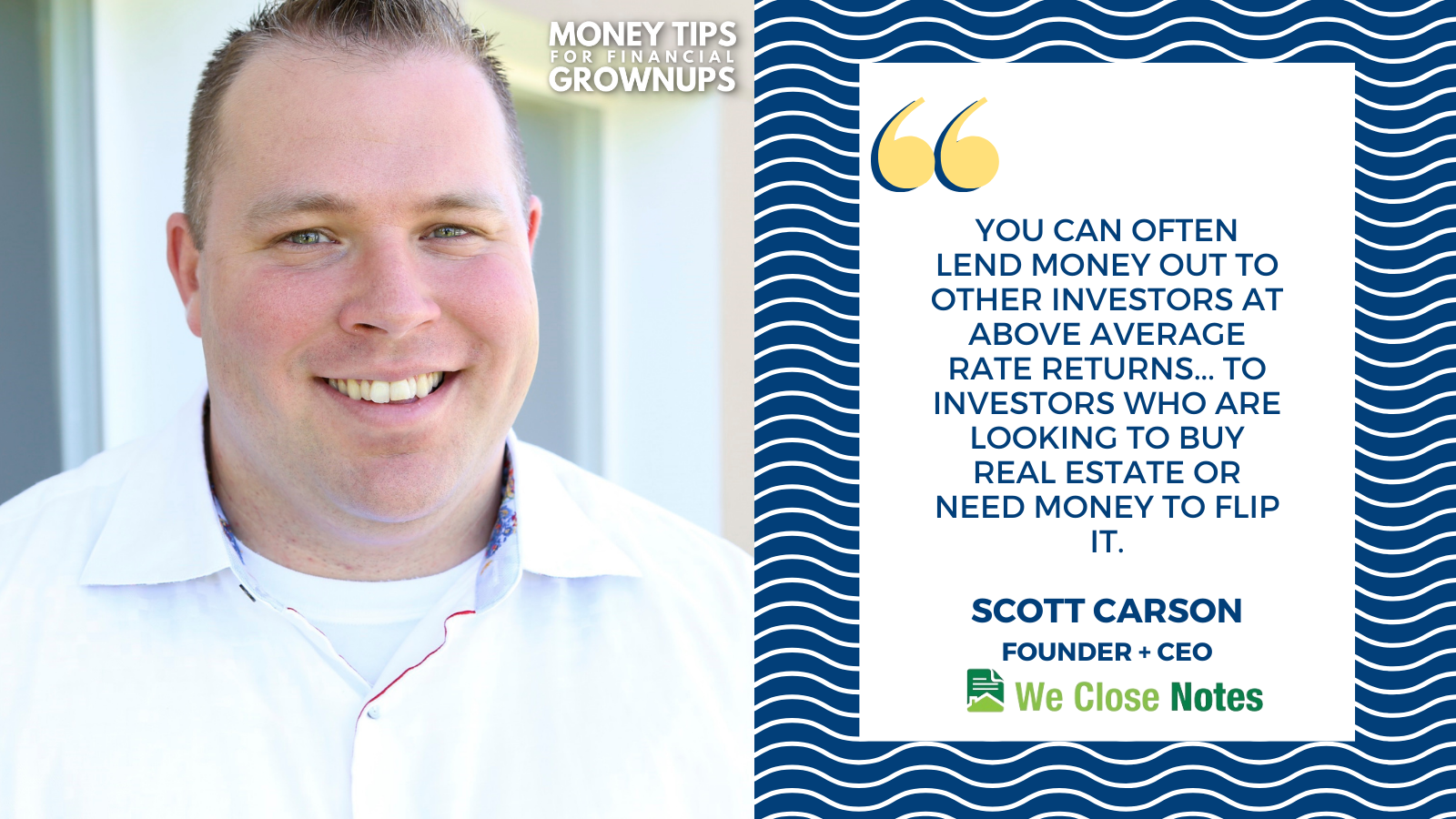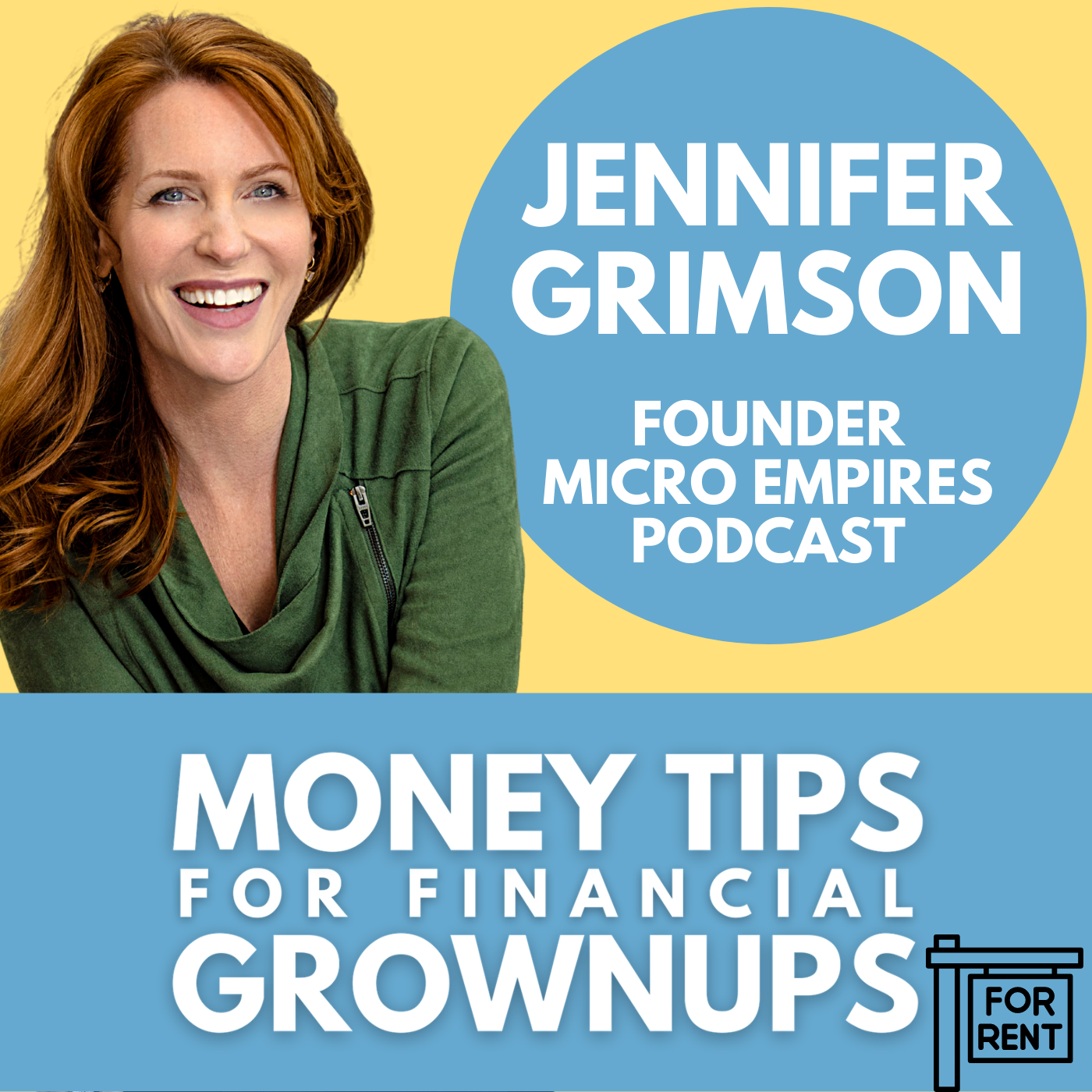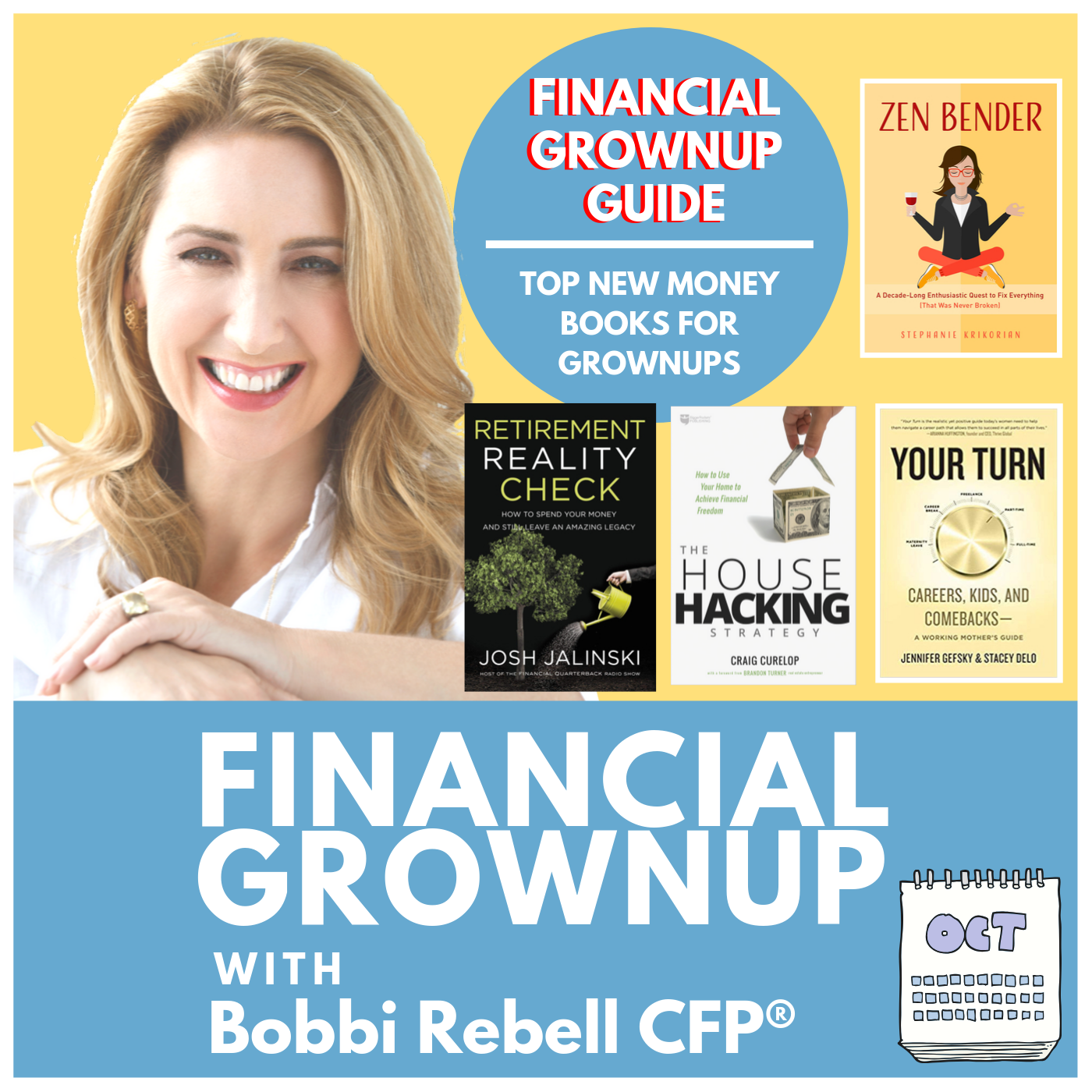Investing in notes can be profitable but it is complicated. Bobbi gets the basics and the red flags from WeCloseNotes.com’s Scott Carson
Follow Scott!
Instagram - @1scottcarson
Facebook -@1scottcarson
Twitter - @1scottcarson
LinkedIn - @1scottcarson
Pinterest - @1weclosenotes
Website - https://weclosenotes.com
Follow Bobbi!
Instagram - @bobbirebell1
Twitter- @bobbirebell
LinkedIn- Bobbi Rebell
TikTok - @bobbirebell
Website- http://www.bobbirebell.com
Did you enjoy the show? We would love your support!
Leave a review on Apple Podcasts or wherever you listen to podcasts. We love reading what our listeners think of the show!
Subscribe to the podcast, so you never miss an episode.
Share the podcast with your family, friends, and co-workers.
Tag me on Instagram @bobbirebell1 and you’ll automatically be entered to win books by our favorite guests and merch from our Grownup Gear shop.
Check out the episode we did together on his podcast!
Full Transcript:
Bobbi Rebell:
Hey, Grownup friends, a big thank you to so many of you that have already bought my new book, Launching Financial Grownups, Live Your Richest Life by Helping Your (Almost) Adult Kids Become Everyday Money Smart.
Bobbi Rebell:
This book was not easy to rate because I had to get honest with myself about what was working with my teen and young adult kids and what was not working. I also had to be prepared to share it with all of you.
Bobbi Rebell:
So, first of all, thank you for your support and your wonderful responses to it. There's definitely some things in there that you may not have been expecting to hear. By the way, I got a lot of help from my money expert friends and also financial therapists and parenting experts. I am really happy with how Launching Financial Grownups came out, even though it really was hard to be, like I said, that honest. It was a lot of work, but I really love doing it, and I'm really happy with how it came out.
Bobbi Rebell:
On that note, if you have not already, please pick up a copy of Launching Financial Grownups today. After you do, please share it on social media. Please leave a review on Amazon. Those reviews are super important because the algorithm picks up on them and that can make the book a lot more visible to more people. I truly appreciate it, and I really also appreciate all of your support.
Scott Carson:
You have many people that walk away, especially in a recession. You have people that just bought a house, got laid off, unfortunately just left. Well, if they've got a really low interest rate on their mortgage, it's a great way for you to take over property without ever having to qualify for financing.
Bobbi Rebell:
You're listening to Money Tips for Financial Grownups, with me, Certified Financial Planner Bobbi Rebell, author of Launching Financial Grownups, because you know what, grownup life is really hard, but together we got this.
Bobbi Rebell:
Are you guys watching the stock market and getting a little nervous again? Maybe thinking it's time to actually look to diversify and look into new places to invest your money, places where it may not be as liquid, it may be a little bit more risky, but you at least have, as I mentioned, a little more diversification, and maybe can see some upside to the economic troubles that some people are calling a recession. This episode is going to be very interesting for you. We are going to be talking about an area of investing that I frankly don't know that much about. It is a way to invest in real estate without actually taking possession of and buying real estate. In other words, you aren't buying the property to live in or to renovate the property, to renovate and then flip it or be a landlord, an active landlord for years, managing it hands on the ground or paying a company to manage it. You're just using financial resources, money, to get some of the benefits of real estate as an investor.
Bobbi Rebell:
I have a fantastic guest to explain to us how it works, and this is important, the red flags. Because while there is clearly opportunity, you have to know what you are doing. This is not for amateurs, but it is for anyone willing to put the time into it who has the right risk profile and is interested in diversification. It's really interesting, I was fascinated. My guest is Scott Carson. He is an entrepreneur, his company is called We Close Notes, and he also has a podcast called The Note Closers. And no, this is not the kind of note that you wrote on a post-it note. I was fascinated by it all. It's all going to be explained to you, it's going to make a lot of sense, and then you can decide if it's right for you. We're going to have some resources where you can get more information if you do want to proceed. But this is really interesting stuff that I wanted to know about, and I really wanted you guys all to know about, just as an option and potentially an opportunity for profit. Here is We Close Notes' Scott Carson.
Bobbi Rebell:
Scott Carson, you're a Financial Grownup. Welcome to the podcast.
Scott Carson:
I'm honored to be here today to share our knowledge and just give to your audience after all those financial crimes that were listed today.
Bobbi Rebell:
Well, I recruited you for this episode because the stock market has been a little bit scary, and I want people to know that there are other ways to invest, especially ways that you can still have some liquidity in different amounts, but the stock market is not the only game in town, and it doesn't necessarily mean you have to buy a property. I will explain more about that going forward, or something where it's not liquid. There are a lot of interesting ways that people can get more bang for their buck in terms of investing. And also, maybe a little bit more with interest rates rising, that creates a different opportunity in some ways. So, your company is called We Close Notes. Before we get into the opportunities, I want you to just explain where you're coming from, and your perspective and your experience.
Scott Carson:
I've been an active real estate investor for over 20 years. Previously a financial advisor with a little company called Smith Barney and Chase Bank back in the day. Got into mortgages and originating back in 2004, but literally have been buying notes, performing and non-performing notes, for the last 15 plus years, since 2008. When the last recession hit, I went from the origination side of the business to the de-origination side, and started buying mortgages direct from banks and hedge funds where people were not paying a mortgage. We make our money by buying that debt at a discount and then working it out with the homeowners to try to keep them in their houses with some sort of plan, without taking the property back. That's our preferred strategy actually, just to come back on track, back paying on time. It turns into a really good return for us, does good for the community, does good for the borrowers. As I like to say, we're making America great again, one defaulted mortgage at a time.
Bobbi Rebell:
We're going to go through five ways to invest in real estate without owning property in just a minute. But I want to take a step back and have you explain, first of all, what do you mean by origination and what exactly is a note?
Scott Carson:
Good question. Origination, we'll start first with that, is where you're creating mortgages or you're getting somebody approved for a mortgage. When you go to buy a house, you usually need to get approved for a mortgage. What that means is that a mortgage broker will evaluate your financials to see what you qualify for. They are going out originating mortgages to Chase or Wells Fargo, or any of the 5,000 plus loan companies out there, basically originating mortgages that way. A note, basically, it's an IOU. If you have credit cards, student loan debt, car payment, mortgage, owe your brother Bubba five bucks, you're in the mortgage space, it's an IOU basically. That's a note space. I like to buy notes that are secured by real estate, which is basically mortgages. I primarily buy mortgages in the first lien or senior lien position. There are seconds or juniors and other things, lines of credit people may have against their houses and stuff like that. But I buy first lien mortgages backed by residential for real estate. Does that make sense?
Bobbi Rebell:
Yes, and that is not the same as a treasury note, correct?
Scott Carson:
That's correct.
Bobbi Rebell:
We think of 10 year notes as treasury notes. This is not what we're talking about here.
Scott Carson:
Exactly. We're talking about the mortgages on the actual properties.
Bobbi Rebell:
Okay. Let's get into our five ways to invest in real estate without owning property. The first way is wholesaling. Tell us about that.
Scott Carson:
Wholesaling is the process of finding a deal, finding a property or a note, finding something at below value, getting it under contract, and then flipping the paper or flipping that contract to another investor for commission. Let's say I'm driving around my neighborhood, which is a common way for investor. They see them ugly property, something that needs some work. They knock on the door, they know the owner and the owner just wants to get away from the property. They're like, "I can't rehab it, I can't fix it. I just want to be done with it." So they may put it under contract. Let's say the house, maybe with some work is worth 150, but they get under contract for 60 because that's what all the homeowner wants, and they're able to say, "Hey Scott, do you want to buy this property from me? I'll flip you the paper. I've got under contract for 60. You can buy my contract for 70 grand, and I'll make 10 grand as the wholesaler."
Bobbi Rebell:
So you're not necessarily putting your own money out there.
Scott Carson:
Exactly. You're basically just getting it under contract and flipping the contract to another end buyer who's willing to pay you commission. We've gotten wholesale fees from anywhere from $500 all the way up to $100 grand before.
Bobbi Rebell:
Right. Tricky to find though, right?
Scott Carson:
It's a lot of work. It's a lot of either direct mail or driving neighborhoods, knocking on doors. You've got to be really good and be a bird dog for a lot of people out there buying. You can make great money like that, but I don't really consider that truly investing because you're just flipping the paper. You're constantly working. There's not really anything coming in long term from it, but it's a great way. Most investors in the real estate side, that's how they get started. Wholesaling and figuring out what's going in their markets, and then either flipping paper or flipping properties that way.
Bobbi Rebell:
If you know a market well, it is something that can make sense for you because you have a sense of what things are really worth versus what people in a certain situation are willing to take to get out of a precarious situation. Okay, number two, buying a note, your specialty.
Scott Carson:
This is my specialty. Most people think when you say buying the note, that means you're buying the property. No, you're buying the debt and becoming, technically, the bank. Now, the beautiful thing about this is you control the real estate without actually owning it. What I mean by when I buy note, I literally buy the mortgage from a bank. I'm usually buying it a big discount, 50, 60 cents on the dollar. But the borrower still owes that money. They still owe what they owe. So let's use some simple math. Let's say they borrow, they bought a house, they get laid off of work, the house was worth a hundred, they financed a hundred. Well, they haven't paid in six months to a year, and then maybe they owe 110 now with back payments. Well, they haven't paid in a year. That bank will often be looking to sell that mortgage, that non-performing note, off to investors like me.
Scott Carson:
I could come in, offer the bank, let's just say 50 grand on a hundred thousand dollar house. Well, I buy the note, I now become the bank, the lender, and I make my money by then negotiating with the homeowner. Say, "Listen, Mr. Homeowner. I know you're behind, you had COVID or laid off of work. You owe 110. I know that previous bank wanted you pay the full year of back payments or six months, you can't afford it. What can you afford? Let's work out a payment plan and get you back on track." So if their interest rate, let's say was 5%, and I bought that note at 50 cents of the dollar, if I get them back on track, that's technically a 10% annualized return to me, which is a pretty good ROI to me.
Scott Carson:
If they keep paying for 12 months to me, then I could technically turn around and sell that note to Wall Street or other investors at 85, 90, 95 cents on the dollar. And if I paid 50 and sell it at 85, I just made a 35% profit on it, plus cashflow along the way. So I like that aspect. I don't want to own real estate. I've been an investor, but buying the note allows for you to control their real estate, work with the homeowners to keep them in their properties if they can. If they don't pay, then we go the route to foreclose because we have the same rights as the bank does.
Bobbi Rebell:
The next one is a little bit of a gray area, to be fair, because we did say not owning property. So it's taking over property, subject to current financing. Explain that, this is sort of a blend.
Scott Carson:
It is a bit of a blend. You have many people out there who live in a property and then can either a) no longer afford to sell their property because they can't afford to pay the commissions, they owe more than the property's worth and they just want to walk away from it. We've dealt with subject to deals like this, what we call subject to deals, where we will step in, take over the mortgage payments of the property, subject to the existing financing and either a) pay the homeowners to walk, make up their arrearages or whatever they're behind on, pay up the taxes. People will walk away from assets all the time. And why this is an advantage to the borrower versus them just walking away is it keeps the foreclosure off their record, which will ruin their credit for seven years.
Scott Carson:
We set these subject to deals basically about three years. It gives us time to make payments on behalf of the bar. What we will do is either put a render in the property that's paying above what the full mortgage payment is, or we'll owner finance property to somebody else in a wraparound mortgage. You should always have an attorney to help you out with this title companies, and professionals out there on the paperwork to make sure everything is disclosed properly, and making sure you're not violating state rules or laws or anything like that.
Scott Carson:
But you have many people that walk away, especially in a recession. You have people that just bought a house, got laid, unfortunately just left. Well, if they've got a really low interest rate on their mortgage, it's a great way for you to take over property without ever having to qualify for financing. One of the great things people don't know is most mortgages were completely assumable prior to 1985, and then VA loans were basically the only ones that were assumable. But me being the bank, if somebody wants to take over the loan on a note, I'm always willing to do that as long as I get paid. And most banks won't care. They do have what's called a due-on-sale clause, and if you're doing a subject to deal and transferring, it looks like a sale. But most of the time the banks aren't going to force it as long as they start getting paid on time. A bank would rather hold a note that's now re performing, versus going through all the problem with foreclose and then take the property back, especially if it's in a state that has a long foreclosure timeframe.
Bobbi Rebell:
So interesting, especially because, by some definitions, we are in a recession right now, so that is an opportunity for somebody. Number four is become a private lender. Tricky, you really have to have capital. How realistic is that?
Scott Carson:
It's actually very realistic. If you've got a 401k from a previous company of some sort, and you move it into a self-directed IRA of some sort, you can often lend money out to other investors at above average rate returns. 6, 7, 8, 10, 12% to investors who are looking to buy real estate or need money to flip. A great way to find people that are looking for these type of investor loans is attending your local real estate investor clubs or networks. There's a whole secondary market of investors that are lending money out, 25, 50 grand, on fix and flips and other things out there.
Scott Carson:
A lot of people think if I live in California, I need 1 million to buy a property. Well, no, there's plenty of people that have bought property, but they needed a little bit of help with repairs to fix up the property, to sell it off on the secondary market. We've actually helped a lot of our students get started as private investors if they've got 25, 50 grand, just to get the ball rolling.
Bobbi Rebell:
The advantage to that is that if you can pair up with somebody who knows what they're doing in terms of flipping a house or something, the other person might have the expertise and you have the financing. So not everyone has both. You may not have the expertise and know where to begin with that. They may know what they're doing and maybe they just need more money to get the properties that they intend to flip, and they have the market expertise to do it. The fifth one is taking over payments and then owner financing to another buyer investor. That sounds complicated, a little bit intimidating.
Scott Carson:
It seems like it, but it isn't. But we talked previously about taking over property subject to. I know a lot of people don't want to be into the three Ts, toilets, tenants and trash outs. They don't want to do that. But if you take over property subject to, and it's got a low interest rate, let's just say 3, 4%... Many people are looking to buy a property that can't qualify traditionally and would be happy to pay a higher interest rate of 8 or 9%, that can bring a sizeable down payment down and have you carry the terms of that mortgage for two years, three years while they work to get their credit back on track, and then they can refinance after a period of time. As always, you always want to have an attorney help with your paperwork and close at a title company, and create the paperwork so it's Dodd-Frank compliant, and there's plenty of RMLOS out there that can help you create that.
Bobbi Rebell:
I'm going to throw a bonus question at you and we have not discussed this in advance, but can you talk to us, another way to invest in real estate without owning property hands-on is REIT. Can you talk about what a REIT is, and the opportunities there?
Scott Carson:
Yeah. A real estate investments trust is a company that has a variety of real estate investments in there. It's a fund and they jump through the hoops of the SEC. Most of the time, it's usually a lot of larger commercial properties in a REIT in a lot of cases, and you can buy a share, and invest in that REIT as a small part of the overall portfolio. And they will usually be paying back an annual return on investment. Often, sometimes, maybe get a little share of the profit on the back end too, as well. But usually, it's just like an investment stock, but in individual stocks of a company, you're buying a share of one commercial property or a portfolio of properties as well.
Bobbi Rebell:
Finally, in this rising rate environment, because we do expect the fed to continue to raise rates, and that in turn impacting the housing market, talk about how that affects this whole idea of investing this, whole strategy of investing.
Scott Carson:
Well, you've got to make sure that your money's not losing value every day. With inflation, stuff like that, our buying power is reducing dramatically in a lot of cases, and you want to be buying something that's got fixed assets to be returning on a solid return to you. That's why cash flowing real estate, buying a rental property that's cash flowing, or investing in a note, because notes do really, really well, and maintain the ROIs as far as continuing to pay. It's a lot of opportunity for you. You got to take advantage of it and be putting money into things like that as part of your portfolio.
Scott Carson:
As always, you want to make sure it's balanced, make sure you're investing in something that you have knowledge in or learning to learn knowledge, and always seek your professionals out there. The biggest mistake you can make as an investor is invested something you have no clue about, or you just listened to a podcast. Go listen to the professionals, talk to people who are doing it. There's plenty of professionals around you to do that, to help you guide your way and hold your hand along the way.
Bobbi Rebell:
Absolutely. But you can learn a lot from a podcast, including yours, which has over a million downloads. So quickly tell us about that, and where people can be in touch with you.
Scott Carson:
Yeah. We have the number one podcast in the note investment industry called the Note Closers Show. Like I said, 700 plus episodes. It's a mixture of me teaching specific nuggets about note investing, and then also bringing on great guest experts. Bobbi will be on here shortly, vendors, and other investors in the industry to help you learn firsthand experience from what their journey has been. Their tips or tools, and strategies to help them maximize, and turn problem properties into profitable solution. You can always find the episodes on any of your podcast platforms, but you can also check out the website, weclosenotes.com that's weclosenotes.com. If you're listing, make sure, if you listen to this podcast, make sure you hit that subscribe button and leave Bobbi a five star review. We as podcasters love to hear from our audience, so do Bobbi a favor and hit subscribe and leave a message.
Bobbi Rebell:
Thank you so much.
Scott Carson:
Hey, thanks for having to me, Bobbi.
Bobbi Rebell:
There is something I don't talk about publicly that I have decided to start sharing, even though it can be a bit embarrassing. I get digital overload and it stresses me out, for good reason. Because when you have so much junk on your computer, because you're not as organized as you should be, because you get caught up and all the things that you have to do, if you don't deal with it, all that stuff on your computer starts to really slow things down and can become a total drag on your productivity. For me, there is nothing worse than finally motivating to get stuff done, only to be derailed by a sluggish computer that is just not cooperating. A little while ago, I decided I was going to stop, just kind of hoping that things would get better and I was going to deal with it.
Bobbi Rebell:
I downloaded something called Clean my Mac. It's from a company called MacPaw. I was skeptical, but I took a deep breath and I tried it. Long story short, it totally worked. I loved how I could see it work through my files with clear and easy to understand graphics. I could see what was messing things up. And Clean My Mac would ask me for my okay before deleting files, so that something I did need to keep didn't go bye-bye. That was one of my biggest fears.
Bobbi Rebell:
I recently reached out to the company and they are offering 10% off to my Financial Grownup listeners who want to also get Clean My Mac. To get that 10% off Clean My Mac, you do need to go to my link. It is BobbiRebell.com/CleanMyMac, B-O-B-B-I-R-E-B-E-L-L.C-O-M/CleanMyMac. And that is all one word.
Bobbi Rebell:
I promise you, you'll be so happy. I want you guys to be in touch with me, let me know how it goes. You deserve to lower the stress of data overload. Trust me, so worth it.
Bobbi Rebell:
Okay my friends, that was a lot, but really good stuff. I encourage everyone to go to my website. Just my name, BobbiRebell.com, B-O-B-B-I R-E-B-E-L-L, where a transcript is available, so you can review all that information if you are interested. Of course, there's a summary via the show notes as well, right there for you. Absolutely feel free to be in touch with Scott through his website at weclosenotes.com. His podcast, The Note Closer, sets over a million downloads, so that is another great resource for a ton of information to get you started. I do want to remind everyone, you need to know what you are doing if you want to do this kind of investing. But lots of interesting stuff there, and potentially lots of opportunity.
Bobbi Rebell:
I want to do more episodes on investing and opportunities for you, so please be in touch and let me know the topics you want me to cover. What do you want to learn more about? You can be in touch by DMing me on Instagram @BobbiRebell1, that's number one, or on Twitter @BobbiRebell. I am also including money tips and investing information in my newsletter, so you can sign up for that right on my website. Super easy, just my name, BobbiRebell.com. Scott and I, by the way, connected through a conference where I spoke, and I would love to get out there and help more people with their money and with investing, and just knowing more about parenting kids and teaching kids about money. So please be in touch through my website, just BobbiRebell.com/speaking if you would like me to come and speak to your group. Of course, big thanks to Scott Carson of WeCloseNotes.com for his help in helping us all be Financial Grownups.
Bobbi Rebell:
Money Tips for Financial Grownups is a production of BRK Media LLC. Editing and production by Steve Stewart, guest coordination, content creation, social media support and show notes by Ashley Wall. You can find the podcast show notes, which include links to resources mentioned in the show, as well as show transcripts, by going to my website, BobbiRebell.com. You can also find an incredible library of hundreds of previous episodes to help you on your journey as a Financial Grownup. The podcast, and tons of complimentary resources associated with the podcast, is brought to you for free, but I need to have your support in return. Here's how you can do that. First connect with me on social media, @BobbiRebell1 on Instagram, and @BobbiRebell on both Twitter and on Clubhouse, where you can join my Money Tips for Grownups Club. Second, share this podcast on social media and tag me so I can thank you.
Bobbi Rebell:
You can also leave a review on apple podcasts. Reading each one means the world to me. You know what? It really motivates others to subscribe. You can also support our merch shop, grownupgear.com by picking up fun gifts for your grownup friends and treating yourself as well. Most of all, help your friends on their journey to being Financial Grownups by encouraging them to subscribe to the podcast. Together, we got this. Thank you for your time and for the kind word so many of you send my way. See you next time, and thank you for supporting Money Tips for Financial Grownups.
















